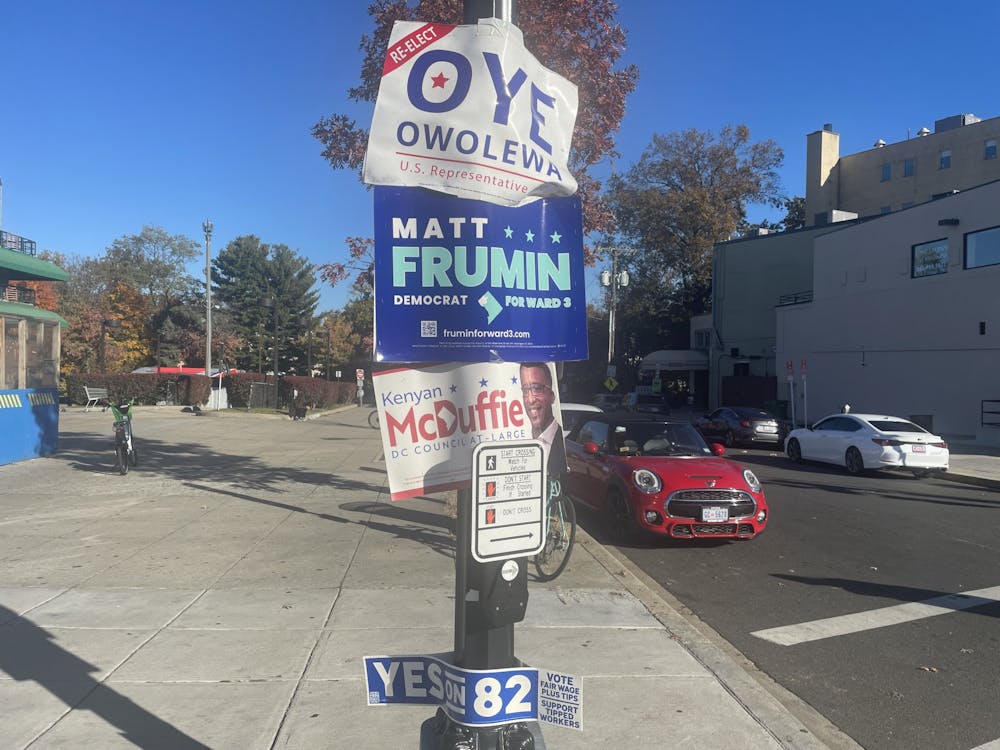The 2022 midterm elections are fast approaching this Tuesday, Nov. 8. On the federal level, all 435 House of Representatives and 35 of the 100 Senate seats will be contested. Additionally, races for state governors are being held for 36 of the 50 states.
Currently, Democrats have a federal government trifecta, meaning they control the presidency and both chambers of Congress, the House and the Senate. The 117th United States Congress consists of 212 Republicans and 220 Democrats in the House of Representatives and a 50-50 split in the Senate, with Vice President Kamala Harris able to break ties. However, the Democrats' hold could change with the results of the election, which will determine the 118th US Congress.
In D.C., multiple city offices are on the ballot. Voters will vote for the open Advisory Neighborhood Commissions seats, as well as for mayor, in which AU alumna and Democrat Muriel Bowser hopes to secure a third term. Additionally, voters throughout the district will choose in races for the At-Large Council, council members for some wards, attorney general, the delegate to Congress and school board members.
Jenn Rafter, a Ward 6 resident who has lived in D.C. for 12 years, said that residents are more frustrated than in years past: “I think that people are a little more frustrated than they have been … people are really upset about the cost of housing and the crime increase so I wouldn’t be totally shocked if there were a couple of … surprising results.”
One major issue that residents of D.C. have been fighting for is gaining statehood and making the district the 51st U.S. state. Leah Mackie, a 2010 alumna of AU’s Washington College of Law, expressed doubts of the possibility of statehood in the near future.
“Until we have a remarkable advantage on the Democratic side in the House and Senate, it’s going to continue to be a struggle,” she said.“That being said, I think a lot more people outside of D.C. realize that it’s an issue and realize that it’s unfair.”
For the D.C. election, there is also ballot question Initiative 82. If passed, it would incrementally increase the minimum wage for tipped employees each year until 2027, which is currently sitting at $5.35, to match that of non-tipped employees, which is at $16.10. Employers are required by law to make up for their workers’ pay if the tips don’t reach minimum wage.
Both Rafter and Mackie said they understand both sides but don’t support the initiative. Mackie, who was a server and bartender for years, doesn’t think people understand how the pandemic has damaged the restaurant industry. Particularly, independent bar and restaurant owners suffer.
“I waited tables and bartended for years and years and years. I never made less than double minimum wage … I probably averaged $50 an hour,” she said. “The tip structure was very incentivizing to really hustle and provide great customer service. When you start shifting the onus of the payroll to those folks [small and independent restaurants and bars] I really worry that it’s going to drive some more out of the industry.”
Rafter shared similar views. “There’s more that could be done to support tipped workers. But I don’t think that raising the minimum wage that high is going to really benefit them at the end of the day,” she said. “Most tipped workers make more than what the minimum wage is and I think that it will discourage people from tipping.”
Proponents of the initiative believe that tipped workers should receive a higher minimum wage on top of tips, and that the current system makes income too unpredictable. Additionally, they say that the two-tiered wage system is discriminatory towards people of color and that workers should not be primarily dependent on strangers’ choices of how much to tip.
Voter outreach on campus
Jackson Reynolds, a junior in the School of Public Affairs and the vice president and director of political affairs for AU College Democrats, said the organization has been doing a lot of voter outreach work for the upcoming election. Among canvassing and bringing candidates such as Bowser to campus, phone banking has been the club’s main focus recently and they have made over 8,100 voter contact attempts so far this semester, according to Reynolds.
“By doing [voter outreach], it’s also making sure that our elections are running smoothly, and making sure that everybody has the chance to vote and making sure their vote is counted,” Reynolds said.
Voters expressed enthusiasm for certain issues on the state level, such as abortion and reproductive rights, criminal justice reform and environmental concerns.
“I know we hear this every election, but it is the truth in that this election is a major election that will determine our future,” Reynolds said. “Most of the issues … happen at the local level. That’s most of what the focus is on.”
Other organizations around campus have also been helping community members with the voting process. AU Votes is a nonpartisan group that was founded over the summer by staff that guides students with absentee ballots, as well as registering to vote in D.C. The initiative stresses the importance of student voting and has helped over 500 students go through the process of requesting a ballot, according to Jacob Wilson, co-founder and co-chair of AU Votes and a first year advisor and AUx instructor at AU.
“We are going to have close elections across the country and young people are going to be the deciding votes,” Wilson said. “Young people choosing to use their voice and exercise their right to vote is going to be consequential.”
Emma Baumgarten, a freshman in the School of International Studies and AU Votes student volunteer, expressed her excitement and feeling of empowerment of being able to vote for the first time this year, and emphasized how important it is for people to vote.
“While it’s not a presidential election, it’s still important and I think sometimes the importance of a midterm election is diminished because it’s not a presidential election … the votes still matter,” Baumgarten said.





